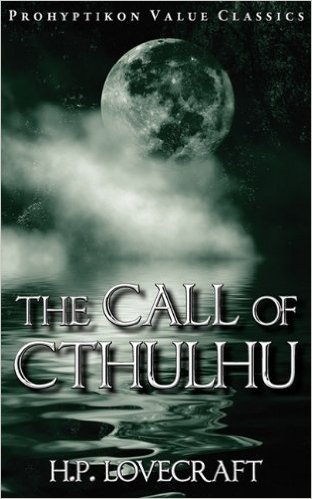Book Five was a classic horror short.
Blurb
“The Call of Cthulhu” is one of H. P. Lovecraft’s best-known short stories. Written in the summer of 1926, it was first published in Weird Tales, February 1928. It is the only story written by Lovecraft in which the extraterrestrial entity Cthulhu himself makes a major appearance.
It is written in a documentary style, with three independent narratives linked together by the device of a narrator discovering notes left by a deceased relative. The narrator pieces together the whole truth and disturbing significance of the information he possesses, illustrating the story’s first line: “The most merciful thing in the world, I think, is the inability of the human mind to correlate all its contents. We live on a placid island of ignorance in the midst of black seas of infinity; and it was not meant that we should voyage far.”
Why I chose this book
After joining a writers’ forum, I saw people talking about Lovecraft in the context of someone who writes great prose. As I’d never heard of him, I decided to check him out. Then I realised he wrote horror and nearly didn’t bother as that’s a genre I really don’t do. In the end, I figured I just choose his famous short story and see how I got on.
Rating/content
I give this book 5 out of 5 stars.
This book follows the story of a gentleman who pieces together a harrowing conclusion about a terrifying doomsday monster. It wasn’t horror in the modern sense of the word, but it was extremely creepy, and I therefore wouldn’t consider it suitable for children. However there is no content above a level of mild peril.
Good points
This book was extremely well written and easy to get through, despite the classic feel to the writing. It reminded me very much of the style of Dracula.
Classic horror relies more on creepy and chilling atmosphere than blood and gore, and this book was no exception. The settings evoked a veiled sense of dread and impending doom. One thing that particularly stood out to me was the ‘weird geometry’ of the land of Cthulhu, where angles were not what they seemed.
The sense of rising tension works well throughout, and I’m left wondering how long the main character survived. The slightly open ending left a suitably creepy hook in my mind.
Bad points
It’s hard to criticise something like this. The narrative style is no longer in fashion, and I think the reader would have been closer to the events had they been told in real time rather than discovered through papers and diaries.
I had high expectations for this because I’d heard people raving over Lovecraft. And to me, it didn’t really seem elevated above any other classic writer. It was really good, but I don’t feel the urge to go and write in the style of Lovecraft – and it would feel outdated to try and do so.
Overall
An interesting read, and one I’m glad I’ve now read. It’s certainly beautiful prose if you want to read a well-written classic. But I won’t be reading any further Lovecraft.

